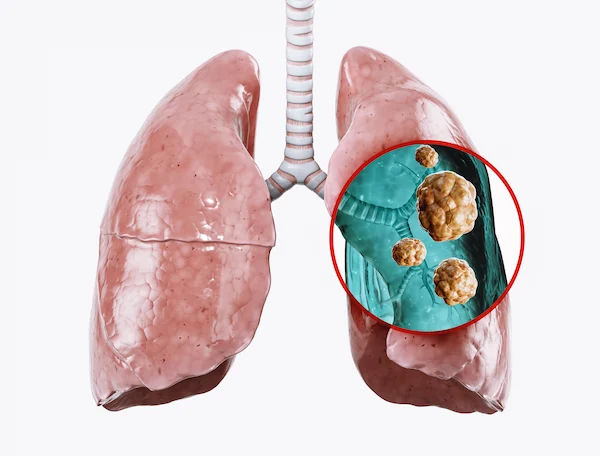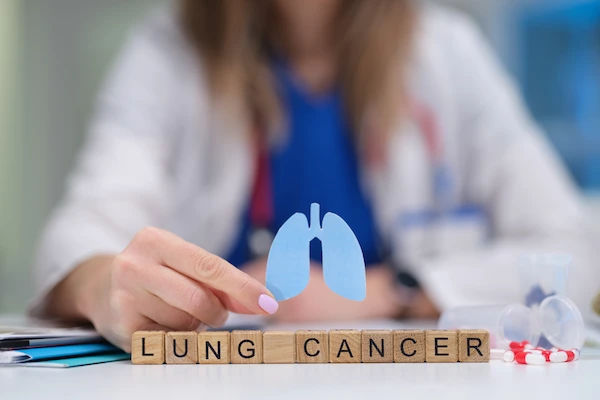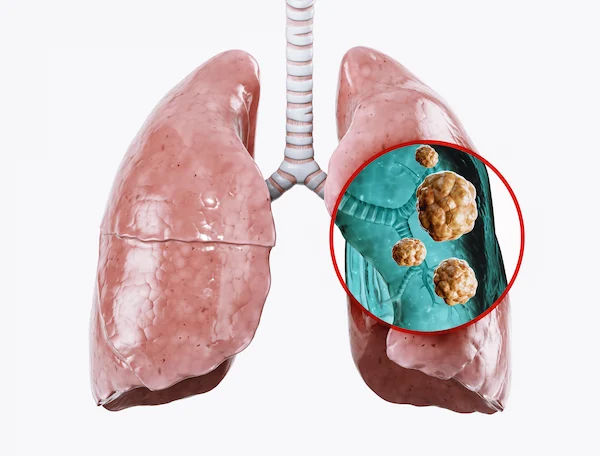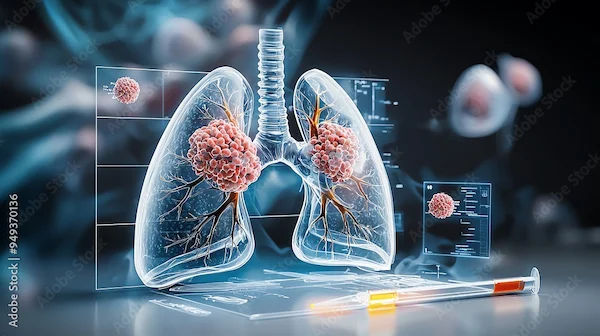Stages of Lung Cancer Explained
Learn about the stages of lung cancer, from early to advanced, with clear explanations of symptoms, causes, treatments, and ways to manage the condition for better outcomes.


Lung cancer is one of the most common cancers worldwide, and understanding its stages can help patients and their loved ones make informed decisions about treatment and care. If you or someone you know has been diagnosed with lung cancer, knowing the stage of the disease is crucial in determining the best course of action.
This article explains the different stages of lung cancer in simple terms, along with symptoms, causes, and ways to manage the condition.
What Are the Stages of Lung Cancer?
Doctors use staging to determine how far lung cancer has spread in the body. The stage helps decide the best treatment options and gives an idea of the likely outcome (prognosis). Lung cancer is typically classified into four main stages:
Stage 1 (Early Stage)
- Description: The cancer is small and confined to one lung. It has not spread to lymph nodes or other organs.
- Sub-stages:
- Stage 1A: Tumour is less than 3 cm in size.
- Stage 1B: Tumour is between 3-4 cm but still hasn’t spread.
- Symptoms: Often no symptoms at this stage. Some people may experience a mild cough or slight breathing difficulty.
- Treatment: Surgery is the most common option, sometimes followed by chemotherapy or radiation to prevent recurrence.
Stage 2 (Locally Advanced)
- Description: The tumour is larger (up to 5 cm) and may have spread to nearby lymph nodes but not distant organs.
- Sub-stages:
- Stage 2A: Tumour is 4-5 cm, may or may not involve lymph nodes.
- Stage 2B: Tumour is 5-7 cm or has spread to nearby lymph nodes.
- Symptoms: Persistent cough, chest pain, shortness of breath, fatigue.
- Treatment: Surgery, chemotherapy, and/or radiation therapy.
Stage 3 (Advanced but Not Spreading Distantly)
- Description: Cancer has spread to lymph nodes in the middle of the chest or other nearby structures but not to distant organs.
- Sub-stages:
- Stage 3A: Cancer is in lymph nodes on the same side of the chest as the tumour.
- Stage 3B: Cancer has spread to lymph nodes on the opposite side or above the collarbone.
- Stage 3C: Cancer has invaded nearby tissues like the heart or major blood vessels.
- Symptoms: Worsening cough, coughing up blood, weight loss, difficulty swallowing.
- Treatment: Combination of chemotherapy, radiation, immunotherapy, and sometimes surgery.
Consult Top Specialists
Stage 4 (Metastatic Lung Cancer)
- Description: Cancer has spread (metastasized) to other parts of the body, such as the brain, liver, bones, or the other lung.
- Symptoms: Severe fatigue, bone pain, headaches (if spread to the brain), jaundice (if spread to the liver).
- Treatment: Focuses on controlling symptoms and slowing progression. Options include targeted therapy, immunotherapy, chemotherapy, and palliative care.
What Causes Lung Cancer?
While not all cases have a clear cause, the following factors increase the risk:
- Smoking (Biggest Risk Factor): Responsible for about 85% of lung cancer cases.
- Secondhand Smoke: Breathing in smoke from others can also increase risk.
- Radon Gas Exposure: A naturally occurring radioactive gas found in some homes.
- Asbestos & Chemical Exposure: Common in certain workplaces (construction, mining).
- Family History: Genetics may play a role in some cases.
- Air Pollution: Long-term exposure to polluted air can contribute.
How Can Lung Cancer Be Managed?
While treatment depends on the stage, lifestyle changes and supportive care can improve quality of life:
1. Medical Treatments
- Surgery: Removes the tumour in the early stages.
- Chemotherapy: Uses drugs to kill cancer cells.
- Radiation Therapy: Targets cancer with high-energy beams.
- Immunotherapy: Boosts the immune system to fight cancer.
- Targeted Therapy: Attacks specific genetic mutations in cancer cells.
2. Lifestyle & Supportive Care
- Quit Smoking: Even after diagnosis, stopping smoking improves treatment outcomes.
- Healthy Diet: Eat fruits, vegetables, and lean proteins to maintain strength.
- Exercise: Gentle activities like walking can reduce fatigue.
- Pulmonary Rehabilitation: Breathing exercises help with lung function.
- Emotional Support: Counselling or support groups can help cope with stress.
3. Regular Check-ups & Monitoring
- Follow-up tests (CT scans, blood tests) help track progress and detect recurrence early.
When to See a Doctor?
If you experience any of these symptoms persistently, consult a doctor:
- Chronic cough (lasting more than 3 weeks)
- Coughing up blood
- Chest pain
- Unexplained weight loss
- Shortness of breath
Early detection improves treatment success. If you’re at high risk (smokers, family history), consider regular screenings.
Need Help? Book a Consultation Today
If you or a loved one has concerns about lung cancer, Apollo24|7 offers expert consultations and diagnostic tests. Early detection and personalised treatment plans can make a significant difference.
Final Thoughts
Understanding the stages of lung cancer helps in making informed decisions about treatment and care. While a diagnosis can be overwhelming, advancements in medicine provide hope. With the right treatment plan and lifestyle adjustments, many patients manage their condition effectively.
Consult Top Specialists
Consult Top Specialists

Dr Suseela
General Physician
5 Years • MBBS
Bengaluru
Apollo Medical Center, Marathahalli, Bengaluru
Dr. Sahana B
General Practitioner
3 Years • MBBS
Koppal
Khushi multi-speciality hospital, Koppal
Dr. Gaddam Manoj
General Practitioner
1 Years • MBBS
Hyderabad
Aaradhya clinic, Hyderabad
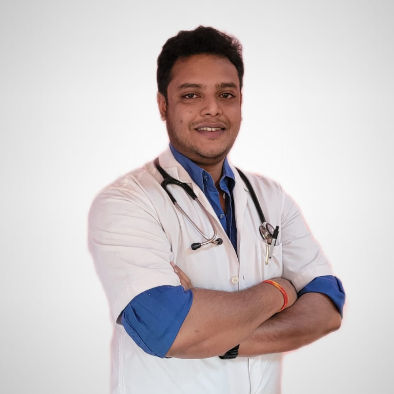
Dr. Mainak Baksi
General Practitioner
13 Years • MBBS , MD (MPH)
Howrah
Mainak Baksi Clinic, Howrah
(50+ Patients)
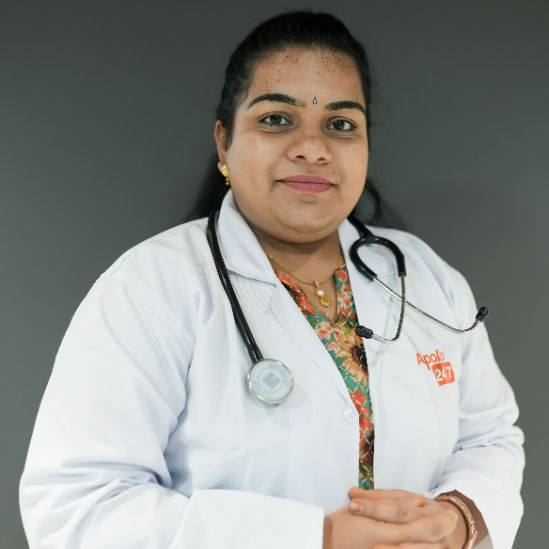
Dr. Siri Nallapu
General Practitioner
5 Years • MBBS
Hyderabad
Apollo 24|7 Clinic, Hyderabad
Consult Top Specialists

Dr Suseela
General Physician
5 Years • MBBS
Bengaluru
Apollo Medical Center, Marathahalli, Bengaluru
Dr. Sahana B
General Practitioner
3 Years • MBBS
Koppal
Khushi multi-speciality hospital, Koppal
Dr. Gaddam Manoj
General Practitioner
1 Years • MBBS
Hyderabad
Aaradhya clinic, Hyderabad

Dr. Mainak Baksi
General Practitioner
13 Years • MBBS , MD (MPH)
Howrah
Mainak Baksi Clinic, Howrah
(50+ Patients)

Dr. Siri Nallapu
General Practitioner
5 Years • MBBS
Hyderabad
Apollo 24|7 Clinic, Hyderabad
